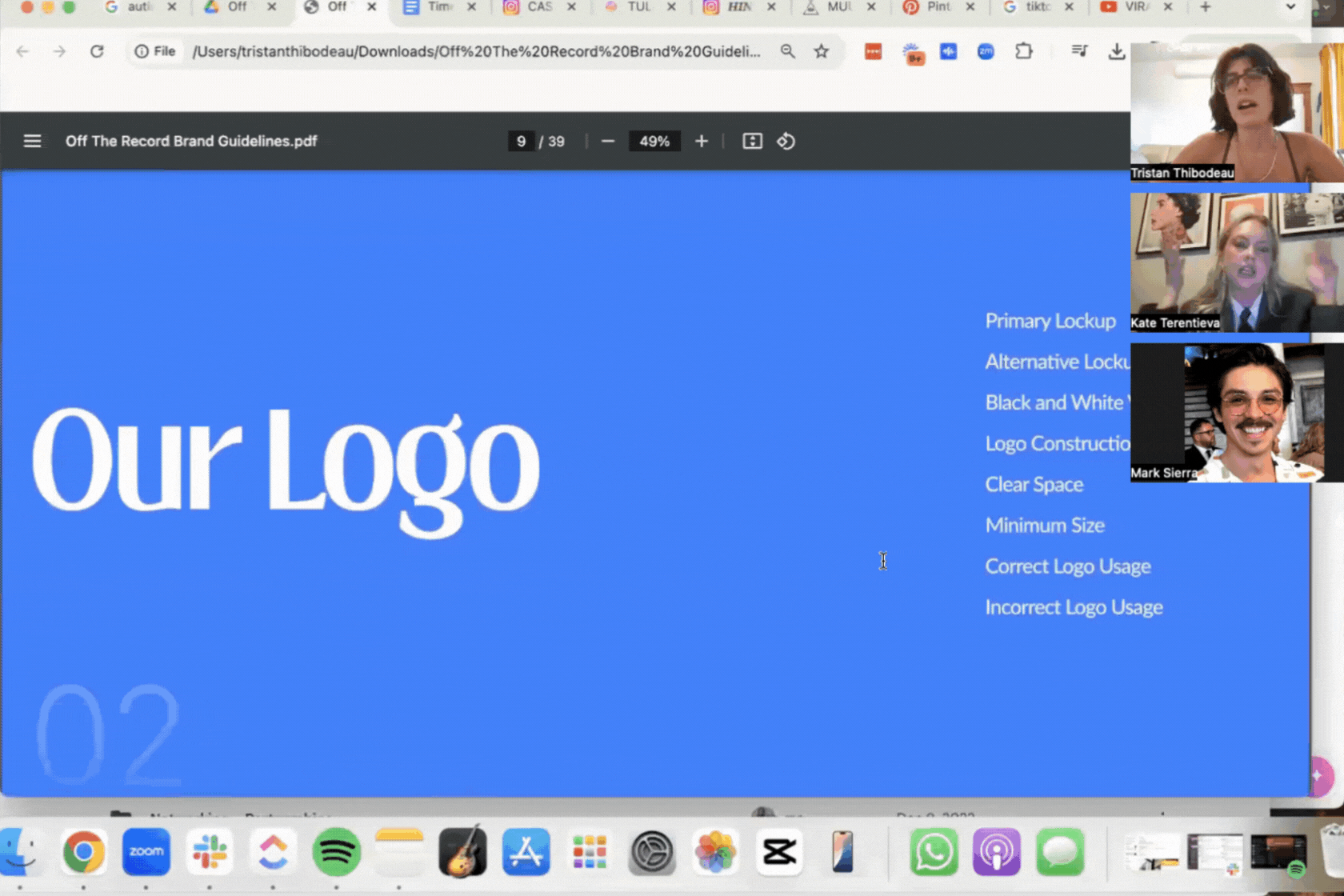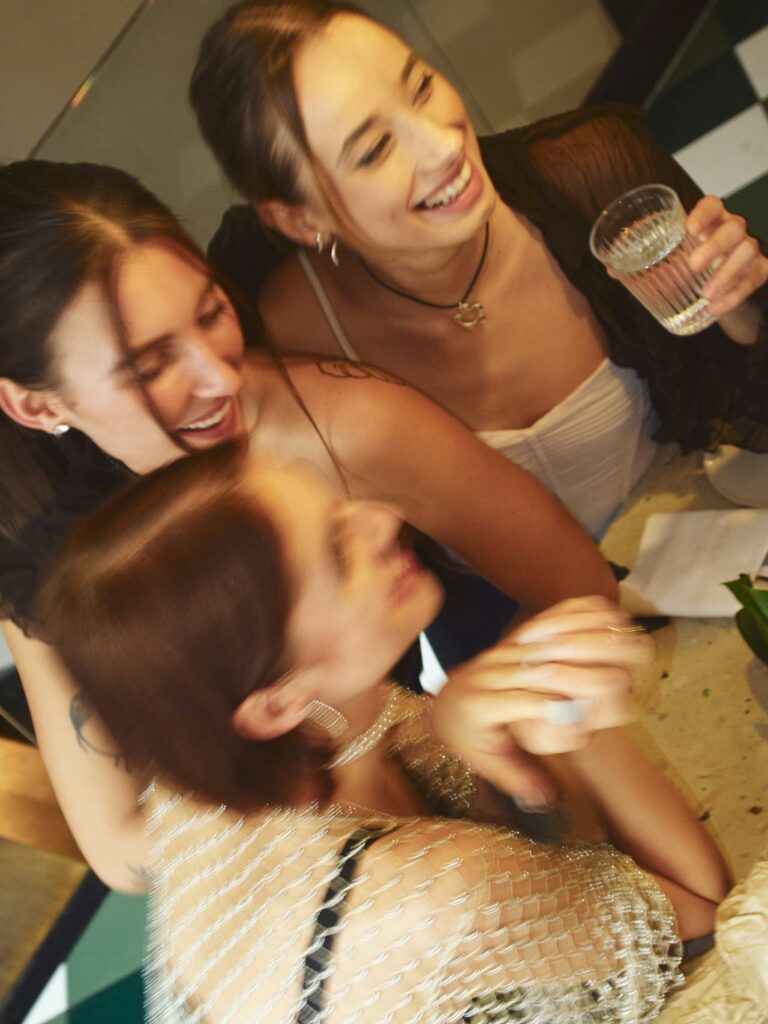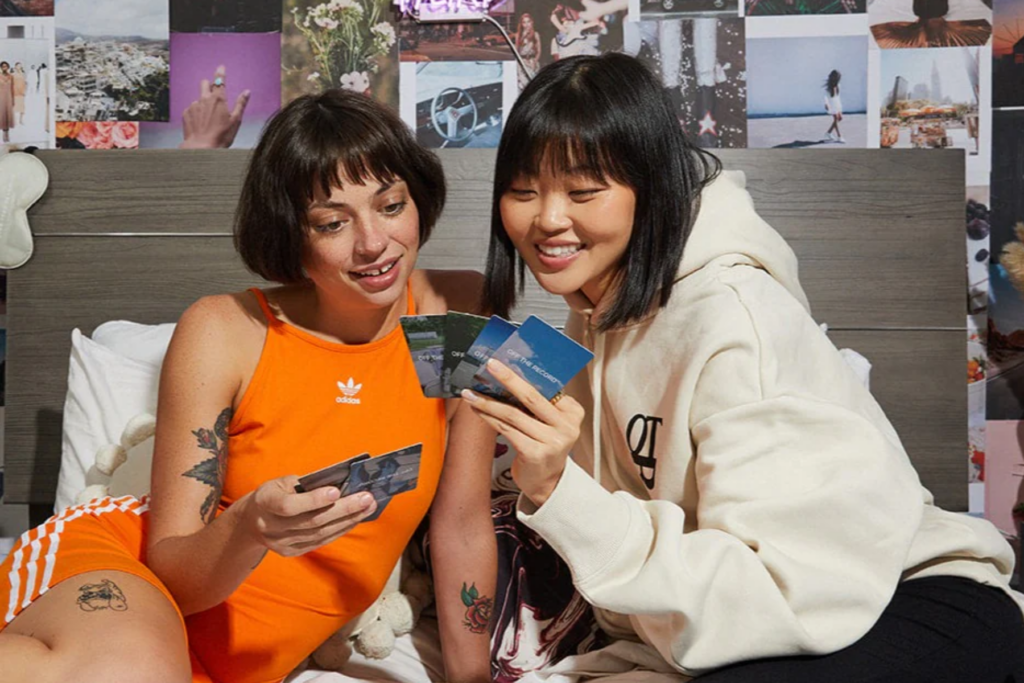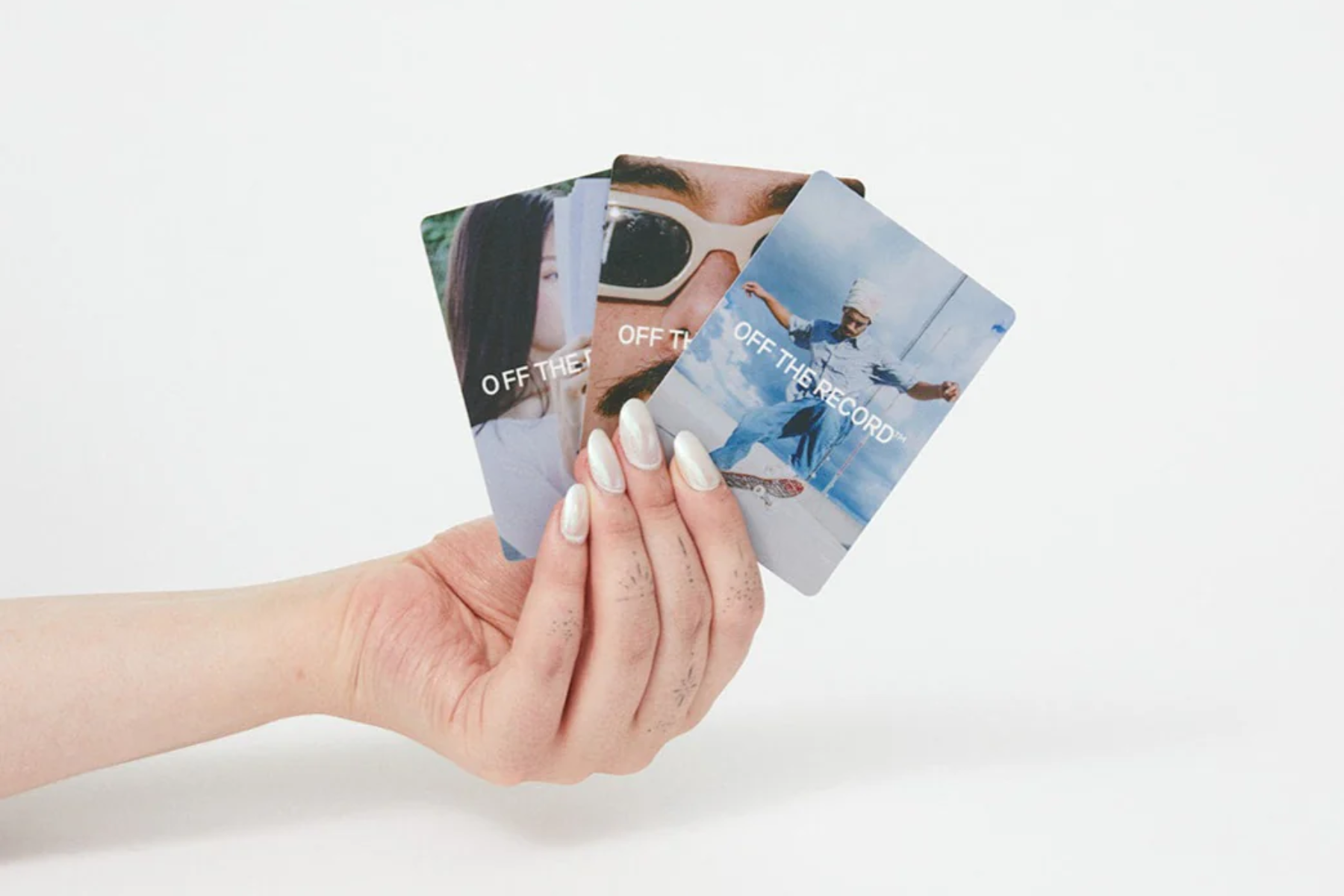Client Overview:
- Industry: Beauty & Lifestyle, Digital Media & Community Building
- Niche: Social Wellness, Consumer Goods
- Topic: Brand Strategy for Social Wellness Products
- Business Type: B2B, B2C
- Scope of Work: Brand Audit, Market Research, Competitive Analysis, Brand Repositioning, Messaging Strategy, Product Development, Retail & Investor Strategy, Marketing & Community Engagement
Off The Record™ (OTR) was founded by Katarina (Kate) Terentieva with a mission to help people transition from small talk to meaningful conversations through a thoughtfully designed card game. But as Kate prepared to expand and pitch her brand to buyers and investors, she realized OTR needed stronger positioning and messaging to stand out in a competitive market.
She brought in Wild Woman Haus® to develop a brand strategy for social wellness products, conducting a brand audit, market research, competitor analysis, and repositioning strategy—ensuring OTR had a clear, compelling narrative that not only differentiated the brand but positioned it as a movement for genuine human connection.

The Challenge: Why a Strong Brand Strategy for Social Wellness Products Matters
While OTR had a unique concept, it faced a few key challenges:
- A positioning gap—the game was marketed as a tool for better conversations, but it lacked a deeper purpose that could build long-term brand loyalty.
- Missed opportunities for emotional connection—the messaging focused on functionality rather than empowerment, missing out on a chance to position OTR as a cultural movement.
- Limited competitive differentiation—brands like We’re Not Really Strangers already dominated the “deep conversation” space. OTR needed a unique angle that set it apart.
- No clear strategy for apparel integration—OTR’s “wearable conversation starters” line had potential but lacked a marketing plan to make it an integral part of the brand experience.
Kate needed OTR to evolve from being just a card game into a cultural movement—one that empowered individuals to become connectors, fostering meaningful conversations in every aspect of their lives.

The Wild Woman Haus® Experience:
Phase 1: Comprehensive Brand Audit & Market Research
We began with a deep dive into OTR’s brand strategy for social wellness products, analyzing its brand identity, messaging, and customer engagement, analyzing:
- OTR’s current positioning and opportunities for refinement.
- Market trends in emotional wellness and social connection post-pandemic.
- Competitive landscape, including We’re Not Really Strangers, Cards Against Humanity, and Let’s F***ing Date.
- Audience insights, identifying core demographics and their emotional drivers.
Key Findings:
- Gen Z and Millennials crave deeper connection, but they don’t just want tools—they want identity-driven experiences that reflect their values.
- The loneliness epidemic is creating a demand for brands that actively foster community and emotional wellness.
- OTR had a unique opportunity to reposition itself—not just as a game but as a movement that makes emotional intimacy “cool” again.

Phase 2: Brand Strategy for Social Wellness Products—Repositioning OTR as a Movement
Our research led us to a bold new positioning for OTR—shifting the brand from being a social tool to a movement that empowers individuals to become connectors.
Original Positioning:
OTR was positioned as a conversation game designed to help users overcome social anxiety and small talk. The focus was on the functionality of the game rather than the bigger impact of connection.
New Positioning:
OTR is a movement that inspires people to lead deeper, more meaningful conversations—making emotional intimacy a cultural norm. Instead of just being a participant, players become catalysts for connection.
Key Differentiators:
- Empowerment Over Functionality – The brand no longer just solves awkward social interactions; it empowers players to lead meaningful conversations and combat the loneliness epidemic.
- From Product to Lifestyle Movement – The repositioning makes OTR more than a game—it’s a cultural statement that extends to apparel, media, and community-building.
- Emotional Depth & Social Relevance – The messaging shifts from “transitioning conversations” to “inspiring a movement of connection.”

Phase 3: Competitive Differentiation Strategy
With the new positioning in place, we mapped out how OTR would stand out against competitors.
- We’re Not Really Strangers (WNRS) focuses on mental health and vulnerability, but OTR goes beyond self-reflection—it empowers users to be leaders in their relationships and communities.
- Cards Against Humanity is entertainment-driven, whereas OTR sparks real, emotional depth.
- Let’s F***ing Date is tied heavily to one creator, while OTR is a scalable, universal movement.
- Glossier (as a cultural reference) built a lifestyle-first brand with products secondary—OTR would follow a similar model but for connection culture.
Key Market Opportunities:
- Personal Relationships: The game facilitates deeper friendships, dating, and family bonds.
- Professional Growth: OTR can be positioned as a networking tool for genuine connections.
- Business & Corporate Wellness: A tool for team-building and leadership development.
- Community & Social Impact: A way to combat social isolation and loneliness.
- Personal Development: OTR teaches emotional intelligence and communication skills.

Phase 4: Creative & Marketing Strategy
Once the brand’s positioning was solidified, we created a multi-channel strategy to activate the movement across marketing, retail, and community engagement.
1. #OTRConnectors UGC Campaign
Encouraged users to share stories of meaningful conversations sparked by the game—building social proof and community engagement.
- User-generated content (UGC) campaign across Instagram & TikTok.
- Incentives for participation (discounts, features, exclusive merch).
2. “Wear the Movement” Apparel Activation
The apparel line was repositioned as “wearable conversation starters,” encouraging people to spark meaningful interactions through fashion.
- UGC campaign showcasing real-world conversations sparked by the merch.
- Limited-edition apparel drops tied to cultural moments.
3. Connection Circles: IRL & Digital Meetups
To reinforce the movement, we launched Connection Circles—virtual and in-person events where people could experience OTR in action.
- Partnered with cafes and bookstores for pop-up game nights.
- Digital meetups and workshops teaching people how to lead meaningful conversations.
4. Soft Masculinity Campaign
Targeted male audiences by normalizing emotional intimacy and vulnerability in men.
- Influencer collaborations with men’s wellness advocates.
- Social media content challenging outdated masculinity norms.
5. Investor & Retail Strategy
To support Kate’s pitching process, we developed a compelling brand strategy for social wellness products, ensuring alignment with sales, investor relations, and long-term brand positioning, including:
- Investor decks and storytelling-driven pitches.
- Retail expansion plan targeting lifestyle boutiques and bookstores.
- Wholesale activation ideas (in-store demos and “Connection Stations”).

Results & Impact: How a Brand Strategy for Social Wellness Products Transformed OTR
OTR’s brand underwent a complete transformation, shifting from a conversation tool to a cultural movement with a clear, compelling narrative that resonated with investors, retailers, and consumers.
With a refined brand identity and strategic growth plan, OTR saw immediate and measurable impact:
- Secured Strategic Meetings – Kate successfully pitched to buyers and investors with a well-defined growth plan for 2025 and beyond.
- Expanded Team – Due to increased demand and brand growth, OTR hired two new team members to support operations and marketing.
- Major Media Exposure – Off The Record™ was featured multiple times via the Jay Shetty brand, significantly boosting visibility and credibility.
- Optimized Brand Experience – Packaging was redesigned to enhance unboxing and user experience, reinforcing the brand’s mission.
- Elevated Digital Presence – The website was updated to reflect the new brand positioning and messaging, improving clarity and customer engagement.

Client Testimonial
“Amidst a repositioning, we at Off The Record™ brought on Tristan to help us strategically realign the brand and take it to new heights. She meticulously and passionately approached the project, completing very detailed audits, market analyses, and providing suggestions from both a strategist’s & consumer’s perspectives. We’re very excited to go into next year with a plan and a direction that feels aligned to our short & long-term vision for Off The Record™. Thanks, Tristan!”
— Katarina (Kate) Terentieva, Founder of Off The Record™

Looking to Transform Your Brand’s Positioning?
If you need brand strategy, competitive differentiation, and marketing guidance to prepare for retail, investment, or community growth, we can help.
Book a complimentary 30-minute call with Wild Woman Haus® founder Tristan Thibodeau to strategize your next steps.
Meet the Team Behind This Transformation

Tristan Thibodeau – Brand Strategist
Founder of Wild Woman Haus®, Tristan specializes in strategic brand development for wellness, beauty, and health entrepreneurs. She helps brands clarify their positioning, refine their messaging, and create sustainable growth strategies. She also hosts The Wild Woman Hotline podcast, featuring expert-level conversations on brand strategy.
